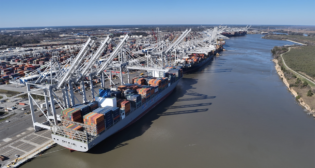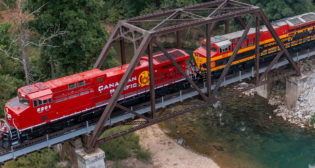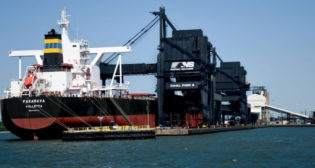
Truck size and weight: Transparency vs. deception
Written by Mark Burton
If you tell a kindergartener that he or she can have ice cream for breakfast with no ill effect and that it will make the lima beans at lunch taste better, that kid will hug your leg and tell you that you’re the best. They don’t see the tummy ache coming or know that you’re lying about the lima beans.
If you tell the American people that heavier or larger trucks will drive down consumer costs, and at the same time, reduce congestion, they too will embrace you, without any thought of the fiscal consequence. Please, can we, somewhere, find some responsible adults?
We can’t afford the form and volume of motor carriage we already allow. Until we resolve issues of highway funding and understand how bigger or heavier trucks will affect highway safety, proposals to increase truck size and weight limits should be off the table—period.
There are three important fallacies to be debunked.
First, proponents of heavier or bigger trucks claim that allowing them will reduce the number of trucks on the road—the congestion equivalent of the ice cream diet. That’s very probably wrong. And in any case, bigger or heavier trucks will undoubtedly mean more ton-miles, highway wear and bridge damage.
The only reason to want heavier or bigger trucks is to lower trucking costs by moving more freight with fewer drivers. In economics, demand curves slope down and to the right. If trucking costs are reduced, people will buy more freight transport. That means more ton-miles of freight on the roads. More ton-miles in bigger trucks may result in fewer trucks, but then again, it may result in more trucks. The outcome is ambiguous, but regardless, more ton-miles will unquestionably mean more truck-related troubles.
Second, those who favor relaxed size and weight standards argue that it’s technologically impossible to levy motor carrier taxes that adequately account for truck-imposed damages. That’s equally untrue.
Equitably and efficiently taxing trucking means taxing ton-miles in a way that reflects truck configuration—a weight-distance tax. The ATA argues that imposing such a tax is technologically infeasible. But that position seems out of step with an industry that is advocating the widespread implementation of the complex technologies needed for truck platooning or other forms of freight vehicle automation. If emerging technologies are capable of monitoring and operating 80,000-pound trucks at highway speeds, surely, they’re capable of monitoring and reporting a truck’s weight and distance traveled.
Third, at the state level, motor carrier lobbyists argue that truck size and weight standards are a states’ rights issue. Actually, they’re not. Even a kindergartener knows about siblings. In the case of states rights vs. commerce, commerce wins.
It’s the competition for economic development that handcuffs states, not federal truck size and weight standards. All federal standards do is limit the bidding wars that otherwise allow states to obliterate their roadways in return for short-run benefits realizable within an election cycle.
To be sure, railroads are affected by allowable truck sizes and weights, but this isn’t an “us against them” fight. Instead, it’s about transparency vs. deception; equity vs. inequity;. It’s about finding some grownups who will withhold the ice cream until we can afford it.

Dr. Mark Burton
Mark Burton is an Economics faculty member at the University of Tennessee assigned to UT’s Center for Transportation Research. His professional career has included both academic and consulting research in transportation economics. In addition to authoring a number of articles and monographs, Dr. Burton has provided testimony in proceedings before the Surface Transportation Board, a variety of state agencies, and the U.S. Senate. In August 2004, Dr. Burton was named as Director of Transportation Economics at the University of Tennessee’s Center for Transportation Research. In addition to his academic work, Dr. Burton has three years of practical experience, serving in Burlington Northern’s Law Department between 1982 and 1985.



